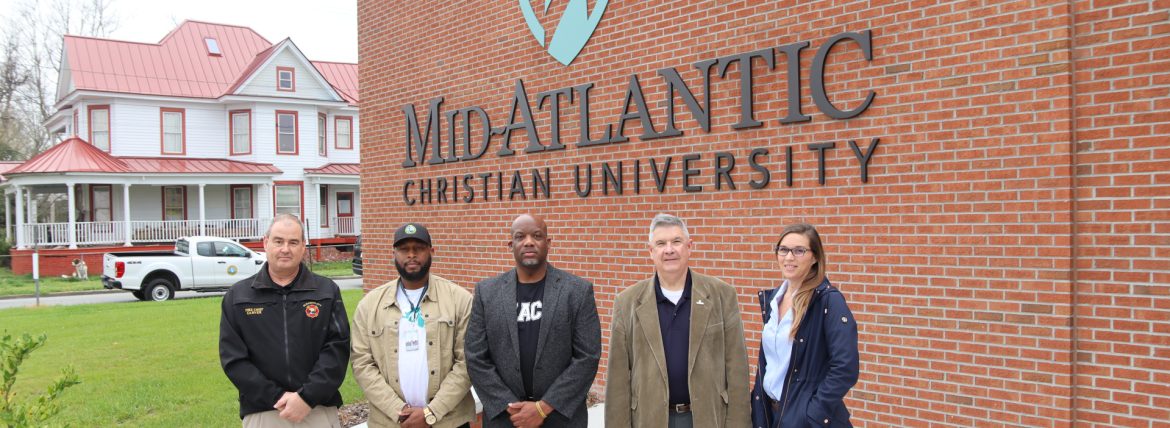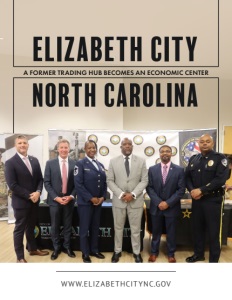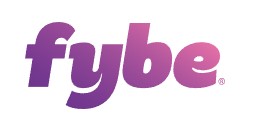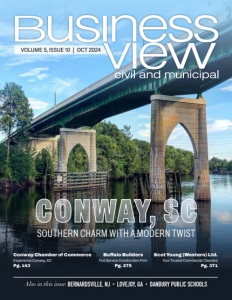Elizabeth City, North Carolina
A former trading hub becomes an economic center
Aviation and education power a city’s momentum
A modern gem nestled within picturesque scenery, Elizabeth City is embracing its historic roots while more than ready to welcome inevitable commercial and residential growth.
Boasting a rich history, Elizabeth City sits where the Pasquotank River begins to narrow on its journey northward from Albemarle Sound in what today is the far northeastern corner of North Carolina. The area was originally settled by the Carolina Algonquians, who named it the place “where the current forks.” Because of its location between the river and the bay, early European settlers developed the locale as a trading hub where cargo was transferred between ocean going vessels arriving and departing the New World, and smaller, more maneuverable riverboats and barges that can ferry goods to and from the heartlands.
Education and aviation
Modern Elizabeth city is a vibrant metropolis of about 19,000, which swells to about 25,000 during the school year when students fill its three institutions of higher learning: Elizabeth City State University (ECSU), an Historically Black College with a highly-ranked aviation program; Mid-Atlantic Christian University (formerly Roanoke Bible College), a private Christian school that competes in Division I-NCAA athletics; and the College of the Albemarle, one of the largest community colleges in the state that helps provide the region with many of its trained workplace employees, particularly in the medical space.
Elizabeth City is also home to Base Elizabeth City, a regional command center of the United States Coast Guard, whose Coast Guard Aviation Logistics Center (ALC) provides centralized logistics support and procurement services for all of the Coast Guard’s 26 regional air stations; whose Aviation Technical Training Center trains every enlisted Coast Guard mechanic and electrician in its fleet; and whose Coast Guard Air Station Elizabeth City maintains, repairs, and overhauls every one of the service’s 200-plus aircraft every four years, making it largely responsible for the U.S. Coast Guard’s world-wide aircraft readiness.
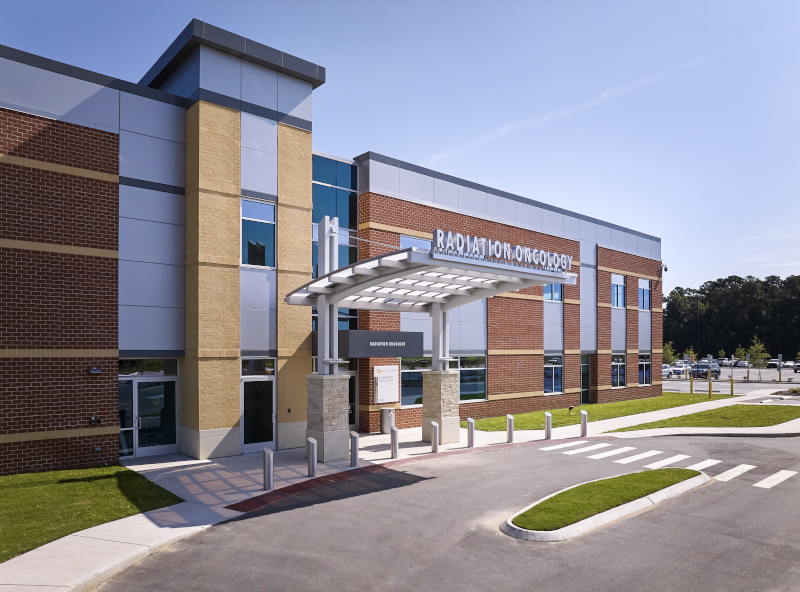
A city on the move
Today, Elizabeth City is “on the move,” according to City Manager, Montre’ D. Freeman. “The city has grown by leaps and bounds,” he states. “The sale of property is tremendous; homes are turning over in seven to ten days from market to close; bidding wars are happening overnight. It’s an exciting time to be a resident of Elizabeth City, North Carolina.” Mayor E. Kirk Rivers agrees. “We’re excited to have people looking to relocate to the city and the Pasquotank area,” he says. “And we’re also going at great speed in our business corridor. We have a brand new hospital being built; it’s a flagship project that will be a game changer.”
Freeman explains: “Sentara Health is currently building a $210 million hospital campus that will service eight counties close to the city, but will have an impact across the state. You can imagine that for a city with a $77 million budget, to have an entity like Sentara to make a $210 million investment is a huge deal.” (Sentara Health is one of the largest health systems in the mid-Atlantic and southeast states with 30,000 employees and 12 hospitals in Virginia and northeastern North Carolina, as well as health plans for more than one million customers in Virginia and Florida.)
A revitalized downtown comes to life
Downtown Elizabeth City has been a huge drawer for both new businesses and residences for several years — the result of public spending, private sector investment, and intense community involvement. “For some time, our downtown was extremely blighted,” Freeman recounts. “Buildings were in bad shape. Then, one developer bought an old, blighted building and transformed it into one of the most sought-after living spaces in the city. That developer has now gone across the street and turned an old middle school into another beautiful living location. In other locations that were once run down and blighted, we have breweries downtown, we have restaurants there. And it’s one of the most beautiful things in the world to see on a First Friday.” (Every first Friday of the month, downtown studios, eateries, and businesses stay open late and downtown comes to life, with music, art exhibits, and more.)
Elizabeth City is also part of the national and state Main Street Programs, first created by the National Trust for Historic Preservation in 1980 to promote downtown revitalization in communities across America. Today, over 2,000 towns and cities in over 40 states coordinate with the Main Street Program in their efforts to improve the viability of their central business districts.
The Main Street Program has four main pillars: Design – enhancing the physical appearance of the commercial district by rehabilitating historic buildings, while encouraging new construction; Organization – building consensus and cooperation among constituencies; Promotion – marketing the district’s assets to local citizens, visitors, and potential investors and new businesses; and Economic Revitalization – strengthening and expanding the district’s economic base.
Elizabeth City’s Main Street Program is the oldest one in the state. It is administered by Elizabeth City Downtown, Inc. (ECDI), a 501(c)(3) nonprofit organization that is managed by a volunteer board of directors, volunteer committees, and one full-time paid staff person, Deborah Melenfant, who works closely with the City Manager to implement goals. ECDI provides a return on investment to taxpayers through increased tax generation, while local governments receive increased tax revenue from improved property values due to property enhancements.
Anya Davis, the President of the Elizabeth City area Chamber of Commerce declares, “Our downtown is our shining star. But growth is happening all across our city and in our county – not just downtown. Of course, downtown drives tourism because that’s what people look for when they’re looking for things to do and places to go. One new business opens up every month downtown. But the hospital corridor is a unique area bringing a different type of business. And on the north side of town, we also have businesses popping up. I have about a hundred new businesses join the Chamber every year, and on average, there are four ribbon cuttings a month to celebrate a new business or a new venture of an existing business. So, it’s a great time for our community.”
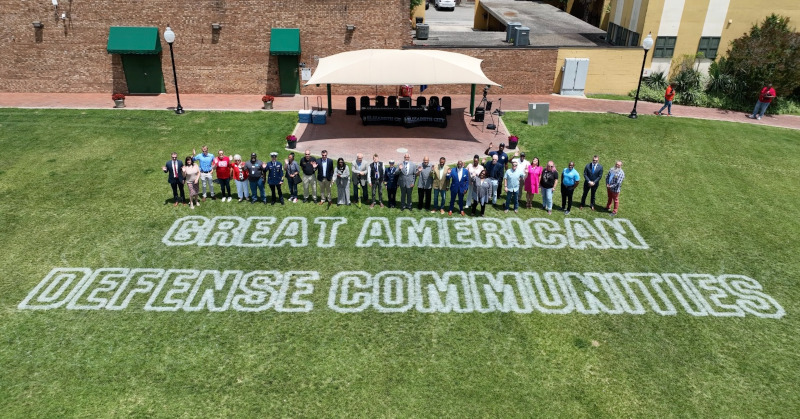
The importance of aviation
Scott Hinton is the Economic Developer for Elizabeth City and Pasquotank County, as well as the Airport Director of the Elizabeth City Regional Airport, home to many light and general aviation aircraft, and a partner with the Coast Guard, which owns its runways and taxiways. “We’re a joint use/military airfield,” Hinton explains. “We have 20 acres on the south side of the airport that provides us access to those runways and taxiways. But everything we do, we look first through the lens of how it will impact the ability of the Coast Guard to provide its services to the public. In our community, there are three large economic drivers: the hospital, the universities, and the Coast Guard, which is responsible for $520 million a year in direct, indirect, and induced economic contributions. The airport and the Coast Guard employ about 3,000 people. So, you can’t overstate the importance of this facility to our community and what it means for our economy.”
Because of the airport’s importance, aviation education has become a key component of the city’s DNA. Elizabeth City State University offers the only four-year Bachelor’s degree in aviation of the 17 constituent schools in the University of North Carolina system. “They have 13 planes, right now,” Hinton shares. “And they’re going to 15 planes, next month, with orders, hopefully, for an additional six planes.”
Aircraft maintenance training is generally the purview of the College of the Albemarle, which offers an Associate’s degree in Aviation Systems Technology, and diplomas in Airframe Maintenance, and Powerplant Maintenance. “Kids that want to work in aviation maintenance can get their training and their certificate right there,” says Hinton. “Between now and the end of the decade, 15,000 pilots are going to retire from Delta, American, and United alone. But the need for mechanics is just as great as for pilots.”
In addition, the city’s high schools participate in the Air Force’s Junior ROTC program, and each summer, several dozen students participate in an eight week program in aviation and aircraft maintenance sponsored by ECSU. Some of them will be taught how to fly by the school’s flight instructors, on the way to getting their pilot’s certificate.
The airport also has its own small flight school staffed by a local flight instructor. “We don’t want to get much larger because we’re trying to roll what is approaching 30-35 flights a day on our side of the base,” Hinton adds. “Last year, we did over 60,000 operations and 55% or those were us, not the Coast Guard. So, we want to be very mindful that we’re not impacting their abilities.”
Workforce education
Other areas of education are just as important to the future of the city and the region. “There is a real focus on bringing students into our business community through internships and training,” says Davis. “Being ready to enter the workforce, now starts with great high school programs. I recently had a call from one of our automotive dealers who was looking for certified mechanics and there were four at one of our high schools. Those students went and interviewed with that dealership, completely certified. So, workforce is a top priority for the Chamber, and by far, a top priority for our businesses. If you don’t have good employees, it’s really hard to be successful.” The city and Chamber also work closely with NCWorks Career Centers, a state program that assists job seekers by improving their skills and hooking them up with employers. “They have a quarterly community partner meeting where they talk about their programs,” Davis notes. “So, there’s a great synergy with all organizations right now to help target and capture people who are interested in those jobs in our community.”
The importance of the internet
Finally, every town and city that portends to be “on the move” acknowledges the need for robust, high-speed internet. And Elizabeth City is no exception. “The entire city should have fiber in the ground within the next six months,” Mayor Rivers reports. “We’re not leaving anyone behind. For persons who cannot afford high speed internet, they will be able to receive it for free. We have not just thought about our commercial customers, we want to make sure that our school kids have access as well, because we understand that our entire city has to grow together, not just one segment; it’s residential, commercial, middle class, working class, college students, Coast Guard — all working together collaboratively. We’re building this city as a team. There’s great enthusiasm right now and we’re excited to share it with the whole world. So, when you look to the northeast, you will see that star, and that star is Elizabeth City, North Carolina.”
AT A GLANCE
Elizabeth City, North Carolina
WHAT: A vibrant metropolis of 18,000 and home of an important Coast Guard command
WHERE: On the Pasquotank River in the northeastern corner of the state
WEBSITE: www.elizabethcitync.gov
PREFERRED VENDORS
Chesapeake Regional Healthcare – https://chesapeakeregional.com/
Chesapeake Regional Healthcare is laser-focused on innovation, expansion and providing patients throughout the region with truly personal care. The health system earned Magnet Recognition® for nursing excellence this year, U.S. News & World Report named Chesapeake Regional Medical Center one of the top 15 hospitals in Virginia, and high-performing in seven adult procedures and conditions. Money.com named it a Best Hospital of 2024, and Healthgrades recognized Chesapeake Regional as one of the top 10% of hospitals nationwide for patient safety.
Since opening in 1976, the former Chesapeake General Hospital has been a major health resource for southeast Virginia and northeast North Carolina residents. Now, care extends far beyond Chesapeake, with practices in Elizabeth City, Camden, Moyock, and the Outer Banks.
In Elizabeth City since 2009, when the Sleep Center opened, the health system’s presence continues to grow. There is a Cardiology, General Surgery and Breast Care practice located on North Road Street, and the Sleep Center, Advanced Wound Care & Hyperbaric Center and Primary Care practice on W. City Drive.
Chesapeake Regional Healthcare is investing $185 million in renovations that started in January 2020 to enhance its services. New facilities include the Priority Toyota Cancer Center, the Richard S. Bray Critical Care Tower, a Lymphedema & Oncology Rehabilitation Clinic, updated postpartum rooms, a Level III Neonatal Intensive Care Unit, and expanded open-heart surgical care. The hospital is a Certified Comprehensive Stroke Center and treats more stroke cases than any other in the region.
As Chesapeake Regional works to better care for the communities it serves, it builds partnerships to address growing needs. The hospital is committed to improving health and access to quality care.
The Bra-ha-ha® is a beloved event in Chesapeake that celebrates survivorship and creativity by inviting the community to design bras inspired by breast cancer. In 2022, the Elizabeth City Chamber of Commerce collaborated with the Chesapeake Regional Health Foundation to bring this event to Elizabeth City, where it has become a highly anticipated annual tradition. Proceeds from the event support local initiatives, including free screening mammograms and related breast health services, strengthening the partnership between the two organizations and benefiting their shared communities.
As Chesapeake Regional approaches its 50th year of service to the community, with more than 50 practice locations and 75 specialties, its highly regarded programs and community-focused initiatives merge leading-edge technology with caring and compassion. Together, they bring medical excellence to the region.
Fybe – www.gofybe.com
Fybe provides fiber internet to communities in northeastern North Carolina. It aims to provide rural residents in the state with unparalleled fiber optic speed and connectivity. It was recently included in the first 25 companies on the Broadband Communities’ Fiber-To-The-Home Top 100 List for 2024.
For more information, visit https://www.gofybe.com
